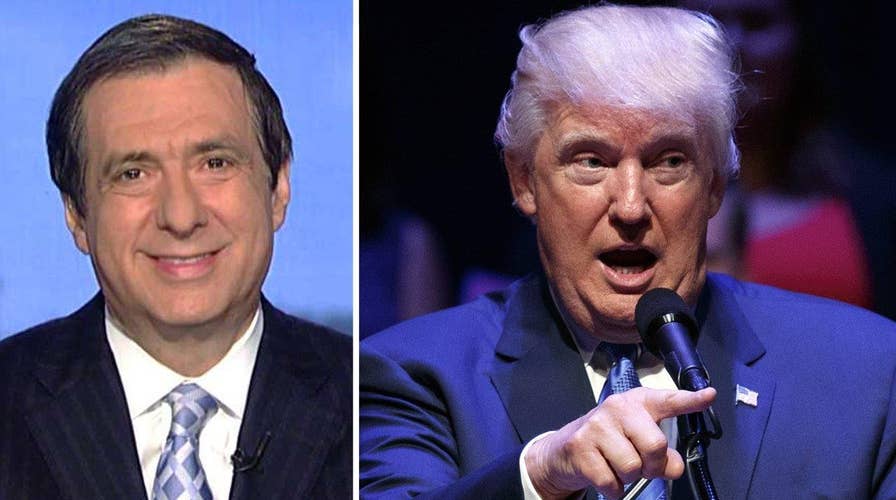At 9 a.m. yesterday, Fox News led off its newscast with Donald Trump’s economic speech on cutting taxes and regulations, including a rebuttal from Hillary Clinton. The on-screen headline: “Trump & Clinton Clash on Economy.”
At the same moment, MSNBC was running this headline: “Growing List of Republicans Turning Away from Trump.” The network was more focused on GOP defectors from the party’s nominee, including Sen. Susan Collins.
That, in a nutshell, illustrates the competing narratives of this campaign right now. Trump is trying to reset after a rough period by focusing on such issues as the economy, while the Clinton camp is showcasing prominent Republicans who are jumping ship.
And that was before Trump set off a whole new frenzy with his casual crack about Hillary and gun-toting opponents.
Both are perfectly legitimate, but which story line do you think has more resonance for the media?
I was pleasantly surprised by the relatively serious coverage devoted to Trump’s Detroit speech. Journalists pointed out that he has moved closer to the Paul Ryan school of economics, raising his earlier plan for a top income tax rate from 25 to 33 percent (still a cut from what the IRS now takes). He offered standard GOP fare, cutting taxes more for those at the top and vowing to eliminate what the party calls the death tax (affecting estates worth more than $5.45 million). He broke with the party establishment in opposing free trade deals. And he threw in a nod to the working masses with a tax credit for child care, even though lower-class folks don’t pay much in taxes (the Trump camp now says it will broaden the benefit).
Clinton drew her share of coverage by calling this trickle-down economics, which means we are back to the same ideological debate that has raged since the Reagan years.
But looking at the New York Times home page yesterday, I saw three stories at the top:
“Key Republican Senator Says She Will Not Vote for Trump.”
“G.O.P. Donors in Primaries Are Turning to Clinton.”
“Mormons’ Distaste for Trump Puts Utah Up for Grabs.”
And below that, in tiny type, was this:
“Trump Supports G.O.P. Tax Cuts, But Balks at Trade Pacts.”
The Washington Post combined both approaches in its lead story: “Trump tries to reset with economic speech—but faces new resistance in GOP.”
The story below that was an op-ed from Collins, who described why she will not vote for Trump because he is a “slash and burn” candidate.
And the story below that was an opinion column by Stuart Rothenberg: “Why Trump Needs a Miracle to Win.”
(In their print editions, interestingly enough, the Post and Times both led with the tax speech.)
The denunciation by the moderate Maine senator was welcomed on the left, with the anti-Trump Huffington Post gleefully blaring this headline: “Collins Can’t Stomach Cruel Trump.”
Also fueling the sense of Republican disunity was a blistering letter signed by 50 former national security officials, many of whom worked for George W. Bush, saying Trump would put the country at risk and “would be the most reckless president in American history.” The signers include Tom Ridge and Michael Chertoff, who both ran the Homeland Security department; former CIA director Michael Hayden; former director of national intelligence John Negroponte, and former deputy secretary of state Robert Zoellick.
That left the door wide open for Trump to say that many of them are “the failed Washington elite,” the architects of a disastrous foreign policy that includes the Iraq war.
The average voter undoubtedly cares more about what Trump would do on jobs and taxes than whether John Negroponte or Susan Collins is backing the billionaire. The problem for Trump is that he hasn’t achieved the same level of support among Republicans as Clinton has among the Democrats.
And the more-disciplined-Trump story line suffered a blow when he went off on Hillary at a rally after saying she would abolish the Second Amendment: “If she gets to pick her judges, nothing you can do, folks. Although the Second Amendment people, maybe there is, I don’t know.” It was not the kind of joke a presidential candidate should make. (The Trump camp says he was talking about the “power of unification” among gun-rights activists to stop her election.)
Trump has been trying to focus the spotlight on his core economic message and his criticism of Hillary Clinton. But with diversions like that, the media may have other ideas.





